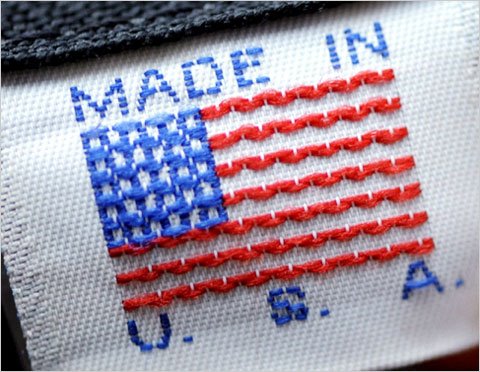Made in USA. Are You Sure?
The Federal Trade Commission is charged with prosecuting manufacturers and distributors that make false or misleading claims that a product is of U.S. origin. Under FTC regulations, for a product to be labeled Made in the USA, it must be “all or virtually all” made in the United States. This standard applies both to express and implied Made in the USA claims, such as including images of the American flag, a map of the United States or references to the manufacturer’s U.S. locations on packaging or in advertisements.
Factors indicating that a product is “virtually all” American-made include (1) a negligible amount of foreign content, (2) foreign content is incorporated early in the manufacturing process and (3) final assembly or processing takes place in the United States. This is not a bright-line or quantitative test. Rather, the FTC, in determining which cases to pursue, takes into consideration on a case-by-case basis the nature of the product and consumer expectations.
Qualified and Unqualified Claims
In its Made in the USA policy, the FTC distinguishes between unqualified Made in the USA claims and qualified claims, such as “Made in USA of U.S. and imported parts” or “Assembled in the USA.” A qualified Made in the USA claim may be appropriate for products that include some U.S. content or processing, but must still be truthful.
The FTC offers the example of an exercise treadmill that, while assembled in the United States, consists primarily of foreign-made components including the motor, frame and electronic display. The FTC cautions that claiming that the treadmill is “Made in America of U.S. and Imported Parts” would be deceptive because the value of the American-made parts is negligible.
California’s Stringent Statute
While many states have false advertising laws, California expressly prohibits the designation of products as Made in the USA or Made in America when the product or “any article, unit, or part thereof, has been entirely or substantially made, manufactured, or produced outside of the United States.” By requiring that “any article, unit, or part” of a finished product be American made, the California law is more stringent than the FTC’s “all or virtually all” standard.
While violation of the statute is a misdemeanor offense, the real risk is a civil class action lawsuit that exposes the defendant to payment of the plaintiff’s attorneys’ fees and class-wide damages.
In one prominent example, the Kwikset Corporation was sued in California state court by a class of consumers that had purchased locksets labeled with “Made in USA” or similar wording that contained screws or pins made in Taiwan or involved latch subassembly performed in Mexico. Kwikset argued that the labels were appropriate because the locksets were “substantially made” in America. The California Court of Appeals disagreed, concluding that if a product consists of separate, identifiable components, the law required each part to be entirely or substantially made in the United States. “Screws and pins are distinct components clearly necessary to the proper use or operation of a lockset because without them one could not install or operate the product.”
Kwikset was enjoined from using any Made in the USA labeling and ordered to notify its California distributors and retailers that any remaining inventory could be returned for replacement or refund.
Avoid Misleading Labels
Companies should evaluate the origin of the components and content of their products and the manufacturing processes that they employ on a case-by-case basis to determine if an unqualified Made in the USA claim is appropriate. California’s Made in the USA statute creates further challenges for companies that assemble their products in America incorporating foreign-made components. If the proportion of the foreign-made components is negligible, the product could comply with FTC regulations but still run afoul of California law. A carefully crafted qualified Made in the USA label, however, could still permit the manufacturer to truthfully tout the American contribution to its products.



I like to see the qualified claims because I will compromise on a partially made in USA item over a completely foreign made item. But I think California’s strict laws undermine some US manufacturers. For example: the Leatherman tool does not say where it is made on the package so I had to call them from the store (in Indiana) to find out they are made, (I can’t remember if it is in Washington or Oregon), but it was someone with an American accent who said it’s the California laws that prevent them from stating it on their package because they have some foreign parts. I bought the tool because there are very few tools made here that are anywhere near affordable.